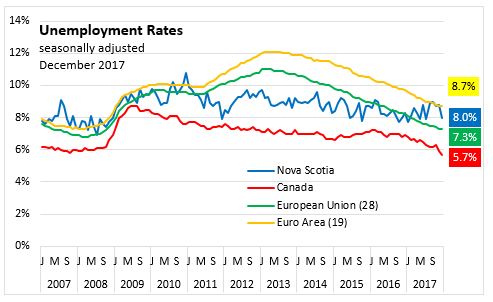The Economics and Statistics Division maintains archives of previous publications for accountability purposes, but makes no updates to keep these documents current with the latest data revisions from Statistics Canada. As a result, information in older documents may not be accurate. Please exercise caution when referring to older documents. For the latest information and historical data, please contact the individual listed to the right.
<--- Return to Archive
For additional information relating to this article, please contact:
January 31, 2018EU AND EURO AREA UNEMPLOYMENT RATE, DECEMBER 2017 
Eurostat has reported that the unemployment rate in the Euro Area in December was 8.7 per cent, unchanged from November 2017 (this includes the 19 countries that use the Euro). For the broader European Union of 28 countries, the unemployment rate was once again 7.3 per cent in December.
The European Union unemployment rate is now very close to the Nova Scotia unemployment rate, which was the case prior to the sovereign debt crisis in 2012.
Among major European economies, the December unemployment rate was highest in Greece (20.7% in October) and Spain (16.4%). Unemployment rates were lowest in the Czech Republic (2.3%), Malta, and Germany (both 3.6%).
Note: An unemployment person is defined by Eurostat according to the guidelines of the International Labour Organization as individual aged 15 to 74 (in Italy, Spain, the United Kingdom, Iceland, Norway: 16 to 74 years), who is without work, is available to start work within the next two weeks and has actively sought employment at some time during the previous four weeks. Canadian results from the Labour Force Survey shown above use slightly different age cohorts.
Source: Eurostat: Unemployment
<--- Return to Archive